Beek Meet 2026

The Largest Beekeeping Conference in Central Wisconsin
Mid-State Technical College and the Central Wisconsin Beekeeping Association (CWBA) are partnering to host Beek Meet 2026, featuring expert speakers and sessions that will help you improve your honey production and beekeeping skills.
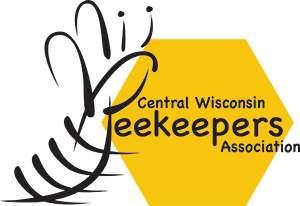
Event Details
Saturday, February 21 | 8:00 a.m. – 4:00 p.m.
Mid-State Technical College | Wisconsin Rapids Campus
500 32nd Street North | Wisconsin Rapids, WI 54494
Pricing Rates
Early Bird rate (good until December 31, 2025) - $80
Regular Registration - $90
Senior (62+) & Veteran - $80
Virtual - $55
Conference Agenda
What’s in store for you at the Beek Meet? Take a deep dive into the presentations on the schedule. Attendees will choose one presentation per breakout session.
7:00 – 8:00 AM
Registration
8:00 – 9:15 AM
Keynote Address
Reading the Comb
Randy Oliver
9:15 – 9:30 AM
Break
9:30 – 10:45 AM
Breakout Session 1
10:45 – 11:00 AM
Break
11:00 AM – 12:00 PM
Featured Speaker
Spring Meeting
Randy Oliver
12:00 – 1:30 PM
Lunch & Vendors
1:30 – 2:45 PM
Breakout Session 2
2:45 – 3:00 PM
Break
3:00 – 4:00 PM
Panel Discussion
Randy Oliver, James Lee, David Burns, and Dr. Dale Hill
Session Descriptions & Presenter Bios
Keynote Address: Reading the Comb & Featured Speaker: Spring Meeting
- Presenter: Randy Oliver
-
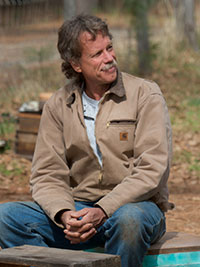
Randy Oliver sees beekeeping through the eyes of a biologist. He now helps his sons to run a commercial beekeeping operation of around 1500 hives in the foothills of Northern California, managing them for migratory pollination, nuc sales, and queen and honey production -- freeing Randy to engage in full-time in beekeeper-funded research projects. Randy analyzes and digests the scientific research, and is in touch with beekeepers and researchers from all over the world, not only to broaden his own depth of knowledge, but to figure out best management practices for beekeepers everywhere, which he then happily shares through his various articles in bee magazines, speaking engagements, and on his website: www.ScientificBeekeeping.com
Keynote Address: Reading the Comb - A summary of my series “Understanding Colony Buildup and Decline.” By acquiring an understanding of the biology of the honey bee colony over the course of the season, and seeing how to "read the combs," the beekeeper can then make their own informed management decisions adapted to their particular situation and goal. I will discuss the cues that trigger bee behavior, colony nutrition, and the impacts of parasites and pathogens.
Featured Speaker: Spring Meeting - How to build colonies up for honey production, while preventing them from swarming. This presentation covers management for spring buildup while minimizing swarming or starvation, supplemental feeding, dealing with the weather, springtime diseases, mite control, and various methods of making splits or nucs.
Breakout Session 1
Option 1: Northern Queen Initiative: Mite Resistant Queens in Northern Climates
- Presenter: James Lee
-
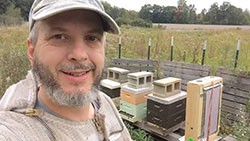
James Lee is the President of the Sustainable Beekeepers Guild of Michigan, a virtual educational organization with over 750 local and international members. He is also the founder of the Northern Queen Initiative and owner of James Lee's Bees in Romulus, MI where he lives with his wife Rachel and their 5 children. James manages 60-100 colonies pursuing sustainability in apiculture and produces nucs and queens with a focus on hardy Northern climate survivors selected for mite-resistance.
SBGMI YouTube
James Lee's YouTube
Sustainable Beekeepers Guild of Michigan
Northern Queen Initiative
SBGMI Facebook Group
The Northern Queen Initiative 501(c)(3), is organized to educate and train beekeepers in queen rearing techniques. We seek to improve the value and production of locally adapted survivor stock queens while focusing on mite-resistance and temperament.
Option 2: How to Inspect a Hive in 12 minutes
- Presenter: David Burns
-
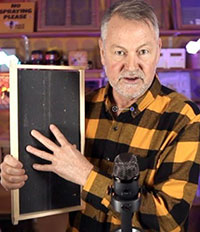
David started beekeeping in the early 1990s and started a beekeeping business several years later. In 2006 David began blogging and uploading beekeeping videos to YouTube. His YouTube channel has grown to around 152,000 subscribers. He also produces a weekly beekeeping podcast. In 2020 David & Sheri were approached by Rockridge press to write the book “Backyard Beekeeping: Everything You Need to Know to Start Your First Hive.” He has produced a suite of online beekeeping courses that have become very popular among new beekeepers. David produces queens, nucs and packages. In order to make sure beekeepers had the best and latest scientific information on bees and beekeeping, David became a Certified Master Beekeeper through the Eastern Apicultural Society (2010). He also writes a weekly column for Bee Culture Magazine. David teaches beekeeping workshops all year at their Training Center in Fairmount, IL. He also has a mentorship program known as Beeteam6, talks throughout the country at beekeeping conferences and is heard frequently on radio shows and podcasts.
David will take us through the important things you should be looking for while inspecting your hive and how to accomplish this in 12 minutes!
Option 3: Hive Diseases and Actions to Take
- Presenters: Brooke Nikkila-Sommerfeldt & Carla Prahl, DVM
-
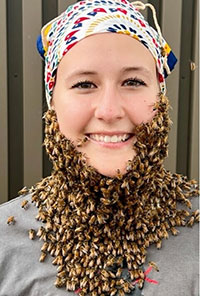
Brooke Nikkila-Sommerfeldt is the Apiary Program Coordinator and State Apiarist for the State of Wisconsin. In these roles, she performs colony inspections, collects bee samples for diagnostic testing, promotes the Wisconsin Pollinator Protection Plan and Beekeeping Best Management Practices, and provides education and outreach to groups throughout the state. Brooke first discovered her interest in bees while doing research at the University of Wisconsin-Stout where she completed her undergraduate degree in Applied Science with a concentration in Biotechnology and spent nine years working at the University of Minnesota Bee Lab/Squad.
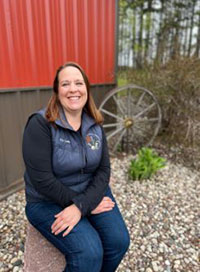
Carla Prahl, DVM is a graduate of Oklahoma State University College of Veterinary Medicine. She is a mixed animal practitioner with a focus on production animal medicine and surgery. Her practice is located in Athens, WI. Her interest in honeybees and beekeeping came about after the FDA instituted the Veterinary Feed Directive in 2017. She now has a small apiary and has incorporated honeybee medicine into her practice offerings.
Brooke will discuss the diseases that can occur in a hive and the treatment options that are available. Carla, DVM and VFD certified, will also be available for questions on antibiotic treatments of hives.
Option 4: Bee Venom Treatment and Lyme Disease (Zoom presentation)
- Presenter: Dr. Patrick Fratellone
-
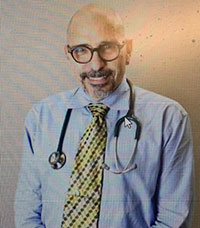
Dr. Fratellone’s guiding philosophy is an individualized approach to total health and well-being that results from nurturing the intrinsic healing of the whole person. He is guided by his personal mission to serve, empower and partner with his patients and community on the path to wellness, transformation, and wholeness. Prior to forming Fratellone Medical Associates, Dr. Fratellone was Chief of Medicine and Director of Cardiology at the Atkins Center for Complementary Medicine under the direction of the late Robert C. Atkins, M.D.
Dr. Fratellone completed his B.S. and B.A. in Biology and Humanities, respectively, at the State University of Stony Brook (New York) in 1982. He completed his medical training in London, where he broadened both his clinical and bedside skills. Dr. Fratellone finished his medical residency at Lenox Hill Hospital, in New York City, where he also pursued and completed his Fellowship in Cardiovascular Disease in 1994. During his three-year fellowship, he trained at the Nicholas Institute Sports Medicine and Athletic Trauma at Lenox Hill Hospital in New York City and the Division of Congenital Heart Diseases at the University of California at Los Angeles. He completed his Integrative Medicine Fellowship at the University of Arizona under the leadership of Andrew Weil, MD He completed his Botanical studies at the Northeast School of Botanical Medicine He is a professional member of the American Herbal Guild.
Dr. Fratellone has been an adjunct professor at the University of Bridgeport College of Naturopathic Medicine since 2014 as well as the Pacific College of Oriental Medicine in New York City He has been a board member of the American Apitherapy Society for 10 years and serves as its current President. He also is a Board Member of the American Herbal Guild.
Dr. Patrick Fratellone's approach to apitherapy and Lyme disease treatment is holistic and integrative. He emphasizes the importance of using both conventional and alternative treatments to address the systemic nature of Lyme disease. His practice includes protocols for cancer, heavy metal detoxification, and autoimmune diseases, with a focus on using vitamins, herbs, and supplements to treat and prevent disease. Dr. Fratellone's expertise in Lyme disease and integrative medicine is well-regarded, and he has been featured on various medical and educational programs
Breakout Session 2
Option 1: The Amazing Honey Bee UP CLOSE
- Presenter: Frederick Dunn
-
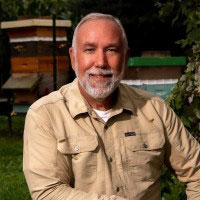
Fred is a honey bee educator, focusing on backyard small-scale beekeeping.
He shares the intricacies of bee biology and management primarily through his YouTube Channel (Frederick Dunn) and podcast, The Way To Bee.
He manages many Bee Hive variations on his rural Pennsylvania property, and has been obsessed with bees and their secrets since 2006.
As a Cornell University Master Beekeeper, Fred uses scientific methods to improve management practices and evaluate tools and hive configurations across a broad spectrum.
Original Photos and video sequences are at the core of his presentations.
“Honey Bees, A closer look.” Along with his great storytelling, Fred takes us on a journey with his bees through spectacular photography, and slow motion videos.
Option 2: Beginning Beekeeping
- Presenters: Mike & Laurie Lawrence
-
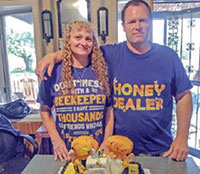
Every year is a learning experience in beekeeping. As master beekeepers, Mike and Laurie have grown from 25 hives coming out of winter of 2024 to 80 hives in the fall without buying any bees. Mike is the President and Laurie is the Vice-President of the Central Wisconsin Beekeepers Association. They are involved in a great deal of teaching from elementary schools through colleges. In addition, they have a YouTube channel with several educational beekeeping videos @hamburghoney. The biggest challenge with educating people about bees that we need to change their mindset about bees. "Not all insects that fly and have stingers are honeybees. Much of the education is differentiating honeybees from wasps, hornets and other bees."
We will be speaking about the first steps in beekeeping, equipment that you need as apposed to what you don’t, and what you should be looking for in your first year.
Option 3: Melissopalynology
- Presenter: Angelina Perrotti, PhD
-
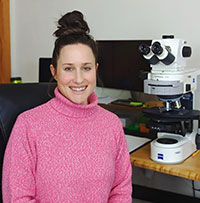
Mellifloral founder, Dr. Angelina Perrotti, earned a Ph.D. from Texas A&M University and has over 10 years of melissopalynology experience. She was trained by the prominent palynologist Dr. Vaughn Bryant and is excited to build on his legacy of offering pollen analysis to the beekeeping and honey community.
I will present the history of pollen analysis in honey (melissopalynology) and applications of this science to beekeepers. I will compare melissopalynology to similar scienfitic honey analyses, highlighting the strengths and limitations of each. I will then discuss the results of all honey pollen profiles collected throughout Wisconsin during the past two years.
Option 4: Winter Feeding for Survival
- Presenter: Dale Hill, PhD
-
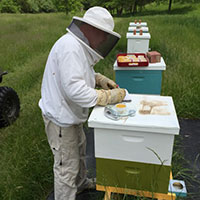
Dr Dale Hill is a semi-retired animal nutrition consultant with more than 40 years of animal nutrition formulation experience with livestock, pets and non-traditional animal species.
Dr Hill researched and developed the AP-23 product that is sold by Dadant (ADM owns the patent). He updated and expanded the Nutrition Chapter in The Hive and the Honey Bee (2015 edition). Dr Hill is Past President of the Illinois State Beekeepers Association and received the ISBA Pioneer Award in 2018.
He had 12-20 hives for 15 years, until he relocated to South Dakota in 2020. Due to shoulder surgery, his beekeeping activities now involve teaching beginning beekeeping, mentoring new beekeepers, interacting with local beekeeping groups. He has been teaching the nutrition section of the University of Montana Master Beekeeping Course for the last 8 years. Dr Hill is also a retired US Naval Reserve Officer.
Dr. Dale Hill, an expert in animal nutrition, emphasizes the importance of providing a balanced diet to honey bees during winter. He suggests that bees require a well-balanced diet to survive the cold months.
Questions?
For registration inquiries, please contact:
Ashley at Mid-State at ce_events@mstc.edu or call 715.422.5347.
For general conference or vendor inquiries, please contact:
Central Wisconsin Beekeeping Association at marathonctybees@gmail.com.
If you have a disability and need accommodations to take part in this activity, please let us know. Contact the event coordinator as soon as possible, ideally 14 days in advance.


